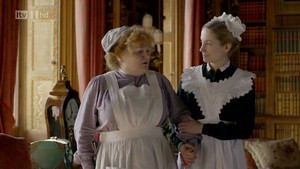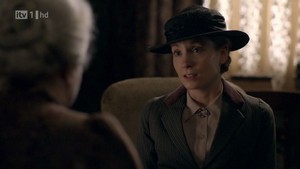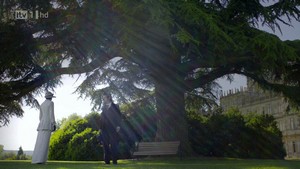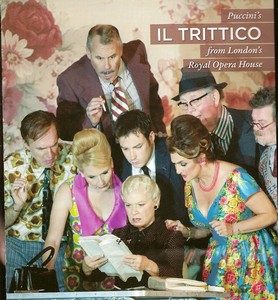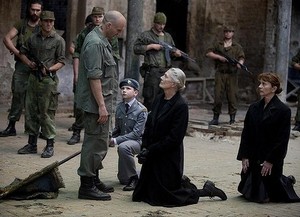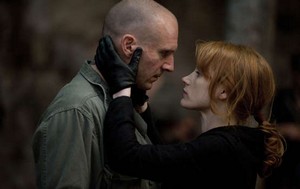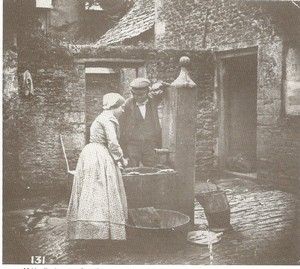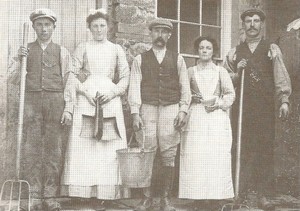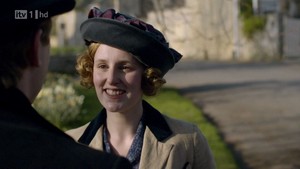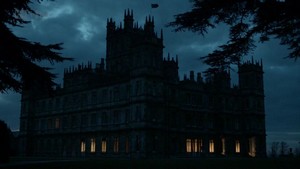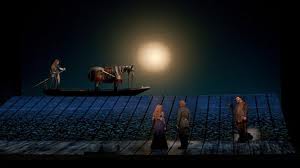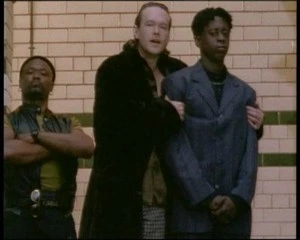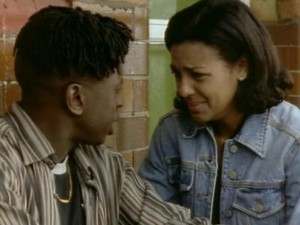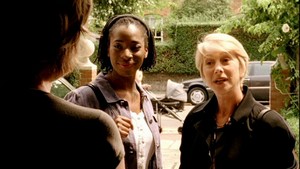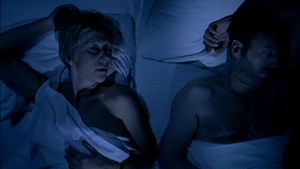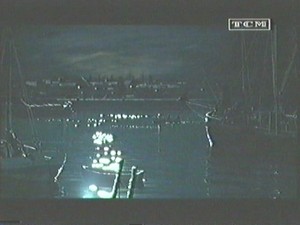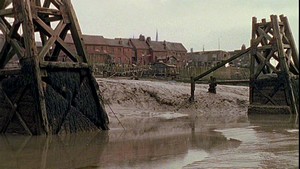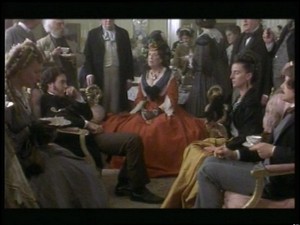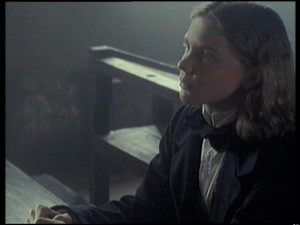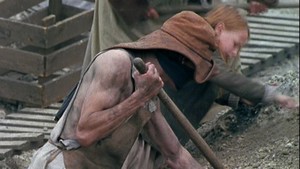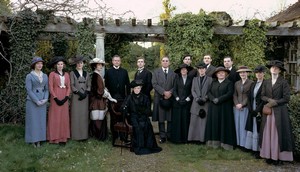
Season 1: the cast in characteristic poses and outfits
Dear friends and readers,
This is the second of two descriptive blogs on the 1st season of Downton Abbey. In the first (episodes 1-3) I suggested some basic paradigms (Austen, Trollope, Upstairs Downstairs), filmic techniques (computer enhanced photography, using rich colors continually, nothing bleached out), and perspectives (male, politically reactionary).

Gwen (Rose Leslie) tells Lady Sybil (Jessican Brown Findlay) that she didn’t get the job (the POV, shot and conversation repeated over and over in episodes 4-5)
I wish I could say in this one (episodes 4-7), why it has become so addictive and a widening sociological event by the time the 2nd season ended. I can’t because identification and bonding won’t do since the character types had become abberant. Viewers mocked and complained, yet watched on. What I did notice by the end of season 1 was how much was piled in (how many stories); how a strict adherence to parallelism between the events of upstairs and downstairs was observed; and how we were made to feel for those were hurt, angry, resentful, frightened, strained

Isobel Crawley (Penelope Wilton) and Matthew (Dan Stevens) her son, told they will be excluded if Cora’s baby is a boy (Episode 7);
a strong adherence to soap opera aesthetics; and, finally, how the moral lessons are continually on the side of kindness, generosity of spirit, loyalty to a friend, and community. These characters are all in it together, including the nasty characters: this is so totally out of whack with what we are told should be our norms for success that it’s startling. Xmas every day in Downton Abbey.

The ceaselessly concerned Robert Crawley, Lord Grantham (Hugh Bonneville) and Cora, Lady Grantham, his wife (Elizabeth McGovern) (Episode 6)
There needs more time and distance to understand the appeal of this particular costume drama. So for now I’ll just survey some patterns for Episodes 4 and 5; discuss Episode 6 generally; and through Episode 7 (a pivotal climax) show how the series is put together. Thematically truth telling on behalf of someone else was at the core of 6. Aesthetically parallelism and recursiveness is at the core of 7.
******************
Episodes 4 & 5

Anna Smith (Joanne Froggart): a pursed grim self-contained presence
I expect everyone will remember how Anna fell in love with Mr Bates (Brendon Coylen). This is another instance of the antidotal nature of the program. I remember Bridget Jones. Emotional fuckwits is what she meets all the time. Men who pretend to commit. People who take advantage. Mr Bates is not an emotional fuckwit. Score 1 for him, an aging disabled Mark Darcy.
How Gwen worked so intensely to get a job, was rejected continually until Lady Sybil stepped in to use her automatic influence with a contractor. That Gwen was not taken is alas par for the course for our world too. She does not have connections.
We learn in both stories that you cannot do or get what you want simply by willing it or hard work.
Then how Lady Mary (Michelle Dockery) began to realize it was Edith (Laura Carmichael) who spread the story of the death of the Turkish ambassador’s son in Lady Mary’s bed — and got back. It’s telling how often the POV of the program is that of Lady Mary — this is a heroine’s text. Michelle Dockery was the abject governess in Sandy Welch’s Turn of the Screw with Dan Stevens the psychiatrist who fails to rescue her from psychiatric prison: it’s a take on James’s story where we see it’s in the interest of the employer to imprison her. Sandy Welch’s deeply felt traumatic sites are given shallower life here.
Finally, how the spiteful lady’s maid, Miss Obrien (Sarah, Siobhan Finneran, denied the respect of a title and the friendship of anyone calling her by her first name) and the lying mocking footman (no coincidence he is made gay) Thomas (Rob James-Collier) did all they could to blacken Mr Bates (they are the bullies in the playground picking on the nice person who they hate because he is nice). All these are the easy cliches, pernicious in some of their implications that enable the mini-series to move along swiftly. They are so expected.
So I’ll remind all of how Mrs Hughes (Phyllis Logan) had another chance at romance and turned it down to remain an independent housekeeper, a story neither peculiar nor cliched. The real flaw of this mini-series is too many stories are woven in without enough time. It gives each one a kind of cut quality and shallowness. We never see Mrs Hughes’s romance up close, it’s only suggested from afar. I wanted much more of it. A great deal of this kind of thing is done, and we are left to root, understand what happened from our own particular memories.
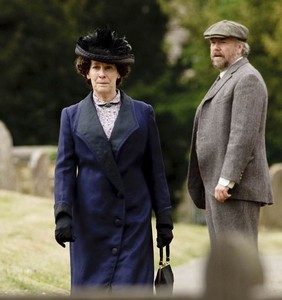
Mrs Hughes walking away from her second chance at love
They were not allowed to film in Highclere, only shoot it from afar. This disconnect between the beautiful rooms and house and gardens began to be felt. (In the 1995 Pride and Prejudice by Andrew Davies, the BBC crew, film-makers and actors really did shoot in and around the house that stood for Longbourne.) The film-makers did all they could to make up for this by filming in beautiful grounds and presenting intimate scenes through far zoom shots.
I did wish we were not asked to forgive Maggie Smith as Lady Violet, Dowager Grantham all the time. This is what we are continually asked to do in Trollope: forgive the old woman with the reactionary views — only in Trollope he has the courage to show her spite. Instead of a show about who gets the prize for roses and didn’t for years; in Trollope characters are at risk for not marrying a good person or not inheriting a desperately needed amount of money due to the Aunt Stanburies (Anna Massey in He Knew He Was Right) of the world. Maggie Smith can act and she managed to give the thread of her finally giving someone else a ribbon he deserved real moving generosity. Why we are to celebrate what she should have done in the first place and not think about previous years doesn’t bear questioning. People do care about little things when the big things they cannot have are placed beyond them.
So Edith is the jealous bad sister — not so bad as Mrs O’Brien and Thomas for she is needled by her sister and justifiably longs for a male companion herself. Here we did have some raw stuff. The second sister in a family would be expected to wait on the eldest. She is goaded into it too. Daisy as the nervous naive housemaid who is lured into telling also makes sense.
As I said in my first blog, I just wish the nasty person wasn’t the person who is real life was powerless and female (Sarah Obrien). Sex would certainly be seething in such a household. This group is in fact remarkably innocent that way. Thomas is shown going after Daisy, the scullery maid, lower cook (Sophie McShera); if he were homosexual he would be after William (Thomas Howe) and try to bully him into a catamite position is a function of the unacnkowledged pastoral nature of this piece.
Mrs Patmore (Leslie Nicol) protects her position as cook, and is hard upon Daisy but no one does anything about this. This is felt real life. Mr Carson as the kind male butler (parallel to Lord Grantham); and avuncular-father substitute to Lady Mary, is by contrast improbable.
Still the mystery remains why this caught on. On US PBS TV the 7 episodes were cut, and in the usual crude ways:
From I should have been a blogger (anibundel):
In America, where this was not expected to be a hit, PBS recut it to be a four-part mini series that were 80odd minutes each. If you do the math, that means the original showing in America lost abut an episode’s worth. For example, the American version cut the snuffbox affair, and only concentrated on Carson noting that the wine count was off. There were a bunch of those little story-lines truncated towards the beginning in order to make space for the story-lines towards the end. Mrs Patmore’s blindness was stretched to be established back in the third episode so that the fourth episode would only show her heading out to London, again, because they needed the room.
Season two, because of the massive hit status, PBS has brought over uncut.
*********
Episode 6

Lady Sybil and her Irish chauffeur, Tom Bransome (Allen Leech) at the suffragette rally
I was drawn in and grated upon by this Episode. Let me treat the worst first so as to get it over: the depiction of leftism was shameful: the left were represented as stupid thugs at a rally; they of course hurt Lady Sybil (it was an early 20th century low key version of Burke on Marie Antoinette I suppose) who was of course rescued by the man who will now rescue the family: Matthew Crawford. The sop was the “good” socialist Irish man, Bransome, who of course was against these thugs and absolutely loyal to Lord Grantham, tender over Lady Sybil, and almost lost his job. He was not sacked because of the sense and civility and of the upper class family.
The workers perspective has not been in US movies since the 1950s. The very purpose of the blacklist was to make sure no more would we get any sympathetic depiction of strikes. And it took. Only on Broadway do you get something different once in a while. The only ones I know of from movies that are pre-WW2 movies (e.g., Talk of the Town). It’s always how inconvenienced are the rich, how thuggish and violent (a no no) the poor. The rich want the “country” to carry on, these sullen badly accented grim sullen types are unpatriotic. Or absurd.
It was the way the 1926 strike was presented in the original Upstairs Downstairs with the saving grace that at least the aristocrats were shown to be drones. Matthew of course is a hard-working lawyer. Sybil is naive, poor innocent dear — her feminism in an earlier episode consisted of putting on Middle Eastern harem dress. She gets larger issues all wrong (how like a woman). Heart in the right place. She is still rooting for Gwen whose quest for employment as a secretary is getting nowhere.
OTOH, the lowest person in the house and a woman comes up trumps — a counterweight to Obrien. Daisy at long last comes up trumps. Our evil pair (Obrien and Thomas) outright lie about Mr Bates: he has been stealing lord Grantham’s wine, was seen taking the key, they say. They enlist the naive worshipful (of Thomas) Daisy to lie with and for them.

Daisy finds herself lying, sandwiched in
Over the course of the hour she finally sees the sterling virtue — I don’t mean to make fun here — decency of William who never lies.
It’s the never lying I was drawn to. William too is to be depended upon; he really cares for the horses he cares for, for others, and for his mother (dying, ill yes, but good woman she would not want to worry him or disturb him in his job so tells Mrs Crawley she must not tell William, and of course Mrs Crawley would not dream of doing so now). It was a moving turn as we watch Daisy gradually see who and what is valuable in human beings as such.

Daisy realizing what William is
When Mr Carson finds out that Thomas and O’Brien have lied, why does he not fire them? he has the power. Mr Hudson (Gordon Jackson) was in charge of the staff; he would fire them. And to keep Cora so sympathetic, we are not as yet shown any deep relationship between her and O’Brien. Wouldn’t want to sully Cora, the lord’s lady. But if there is no intense relationship, O’Brien lacks all power base.
Daisy’s story parallels Lady Mary as well as Mr Bates. Lady Mary finally is brought to admit how much she likes, nay loves Matthew Crawford. This is done far too quickly and is not really developed sufficiently for the six programs, but their scene together is superb. Dan Stevens is finally allowed to have a keen witty hard look in his eye, strong wary intelligence and (like Wm) clear integrity and at the end of the scene he asks her to marry him.
Edith’s anonymous letter has reached the Turkish embassy. Mrs O’Brien and Thomas blackening Mr Bates parallels Edith blackening Lady Mary. In one Maggie Smith’s witty moments when told this she asks if anyone ever visits it. Perhaps one or two persons go to the Turkish embassy? This gives Cora a chance to tell the truth and defend her role in placing the dead young man back in his bed and covering the incident up to the Dowager. So Cora too is a parallel instance to Daisy’s.
Mr Bates will not defend himself as that would be to attack Thomas and be like him. This is carrying things too far Anna feels (and so we are to feel). Then sudden revelation: he used to be an alcoholic and thief; he was in jail. Why this was dragged in I don’t know — to make a point about how once in jail does not mean your character is forever that. It can be read that way, but it was too sudden; unprepared for (though explained why he was loathe to come forward) and not given enough detail to make us enter into whatever happened to
If so, Brendan Coyle has been made the site of the most radical aspects of the show’s humanity thus far him, and that this might just be semi-meant is reinforced by his not being handsome. He does not fit any kind of macho ideal, — and neither does Matthew Crawley or William Mason for real either.
*********
Episode 7

Anna: “You’ll be fine.” POV: Mrs Patmore on the hospital bed

Mrs Patmore waiting, facing what will be her physical ordeal: for me the most moving moment in the season
The pro-active linchpin characters of this episode are women. First, Anna who stands by Mrs Patmore before Lord Grantham (Mrs Patmore could be fired for disabling cataracts); Anna takes Mrs Patmore to London and braves huge institutions to find out the truth about Mr Bates’s past. A secondary parallel is found in Lady Sybil who at the last engineers the job for Gwen. The bad remorseless witch of this piece is Lady Rosamund (Samantha Bond comes in for this thankless role — she was calculating brothel-madam in Fanny Hill) while at long last Sarah Obrien is humanized.
The motif is waiting. We see many characters waiting.
This was an extraordinarily chock-full episode. The decision had been made to have another season and so the story-line had to be fixed so it would look forward to further development yet satisfy for a full year. There were many threads to bring back, & new directions to take. Were this a novel it’d be four Victorian volumes in itself.
We see how much piled in, how much is contrived, and how the themes made parallel mirror our own preoccupations. What really drives the characters wild is fear of being sacked (fired) or simply erased and made invisible (the Crawleys are to be pushed out if Cora Lady Grantham gives birth to a son).
It opens with a zoom shot from on high of what looks like a museum. Mrs Hughes is hurrying the maids because the Granthams will be back from London shortly. Hurry up girls, get the set ready.
Mr Carson arrives with the Granthams and Mrs Hughes asks, How was London? Cora, Lady Grantham, asks her how she has been doing — for all the world as if they were neighbors. Mrs H as usual makes the best of her life. Lord Grantham has the murder of the archduke on his mind (he is the bell that rings the coming war) while Cora frets over coming garden party Mrs Hughes must manage.
Downstairs: Mrs Hughes tells Carson Mrs Patmore worse than when you left, much worse; Mr Bates status hanging in there but something must be done about Mrs Patmore, although Mrs Hughes doesn’t want the poor woman sacked and we see suffering Daisy.
Upstairs: Bomb falls: Cora, Lady Grantham pregnant. We are to surmise they had a good time in London. Physician arrives.

Lady Rosamund and Lady Mary (many far shots in this episode)
Switch to London park where Lady Rosamund giving Lady Mary bad advice not to take Matthew Crawley now that’s he’s not sure to be heir. So now Episode 6 cancelled: at the close of that it looked like Mary
and Matthew were a pair, and scene was moving and maybe they will but
another season has made Fellowes prefer not to give us this coda.
This is followed by (unexpectedly) reappearance of Lord Nadier who visits Lady Mary and tells her that his wedding plans are not going very well: they’ve decided to call it off. He has come to reveal to her it was her sister’s letter that gave away what happened when Pamuk died; he did not want her to think he is the source of these stories.
Downstairs: Mrs Hughes now suggests to Mr Carson that Lady Mary could throw Matthew over now. Parallel to Lady Rosamund.
Upstairs and Duchess’ house: Duchess tells Cora that her maid is about to hand in notice and she must look for another; nothing worse than losing one’s maid says Cora. An exposure her superciliousness: we are to react to this as ironic.
Lord Grantham walking across green landscape near castle (computer generated scene) tells Matthew he will make provision for him if it’s a boy and Matthew gets pushed out. Matthew ever the martyr:i t’s fine, he understands. No Mary has said nothing. And then Grantham asks for the name of Crawley’s cook.
Downstairs: Mrs Patmore doing badlyl; Daisy tries to help; Thomas needles William.
Mrs Crawley now bitter, but Matthew (names allegorical as well as from Vanity Fair) insists it is generous the offer of the house; again tells his mother that Mary has said nothing. Moseley (valet and butler who now loves Anna from afar) comes in with a message for the cook. Cook called upstairs. Told Lord Grantham needs her services. Mrs Bird “I’m surprised Lord Grantham knows that I exist sir’ — this is the best line in the hour.
Downstairs ugly happenings. Carson tells Lord Grantham that Obrien (we are told) was at her usual foul work in London, made a friend, a lady’s maid, and Carson has a letter which Mr Bates refuses to say is false: “He wishes he could” say so.
And again Rosamond, his lordship’s sister, in London tells Mary to wait until child is born. Like some kind of chorus of crows.
Switch back: Lord Grantham finds it hard to believe letter about Bates
stealing regimental silver; petty thievery; at last Carson says he wouldn’t put anything past Thomas or Miss O’Brien (It does not make probably sense the pair would not be fired)
Female family conclave as they wait for dinner (Laura Ashley fashions): Edith about to offer Mary pragmatic advice not to accept as Rosemary did (so another cross against Edith), but Duchess Violet says if you accept him now he will love you to the end of his days. and you could change your mind afterward. It’s the second that Lady Mary doesn’t have the strength for.
Then just the two older women: Duchess to Cora, her maid is leaving to get married, “so selfish” says Cora (back to ironic exposure but not pointed, not well done really); she will put an ad in for her mother-in-law. Then on Matthew, Duchess Violet says: she “knows those men of the high moral ground”; if Lady Mary doesn’t accept him when he’s poor, he won’t want her when he’ll be rich …” Cora: I know it’s a boy which is an answer which supports Lady Mary.
One has to see that the underlying amoral thrust of the show is on the side of Lady Mary not taking the man she supposedly loves. So here we have materialism and prestige as trumping values. And if only the duchess Violet is for Mary saying yes now,it’s because she thinks Mary could change her mind if it’s a boy. She should do it to grab him not because she means it.
Now a dialogue downstairs about coming war — to match concern upstairs of Lord Grantham.
Grantham sends for Mrs Patmore and Anna. Embarrassing scene; the two women so craven and we are not to be appalled at it all.
Scene supports present day arrangement of thoroughly inegalitarian society in the US. Perhaps this is the most reactionary moment of the hour. The kindly Lord sending the old women to London for her eyes.
Mrs Bird brought in and we are encouraged to laugh at the pair of the cooks fighting for position. It trivializes them too.
Matthew very angry at Mary — powerful scene under tree – he is getting more and more raw and irritated by all that has happened to him. Now this is the best scene in the hour, bar none. She defends herself by saying she could have followed her grandmother’s advice and pretended to take him:
He: “To make that work you’d have to be a good liar. Are you are good liar?”
She: “Well, not good enough to try.”
Lord Grantham to Mr Bates: “How could you not think they’d not be discovered at once and keep them in your house?” So we learn what Mr Bates is accused of. A swift way of telling a story, telling the chief characters’ reactions, & showing story not credible. Shot of Mr Bates listening: Then Grantham’s voice: “But you only served 2 years – all very puzzling” Absurd: Mr Bates holds his ground for his right to be a crook.
Something awry here. Not thought out. Do they want to bring in people in prison? one of many peculiar permutations we’ll see take over the series in season 2.
Downstairs parallel: Anna telling Mr Bates “Sorry I don’t believe it.” That odd use of sorry I’ve seen so often: the person prefaces something they are about to say or do with an apology and in fact such words mean they are not sorry at all and are said aggressively as here.
We are supposed to enjoy the catty scene between Mrs Bird and Mrs
Patmore. I don’t.
Back to Matthew and Mrs Crawley: she is very sad: “I thought Mary was
made of better stuff. He, like all these noble males, “Don’t speak
against her” Straight from soap operas of the 1950s. Now why did we
need to have two scenes of the Crawleys. Think a bit: others are
equally idealistic, but it’s not so obvious since they are not being
sacked. In effect Crawleys being sacked.
That Fellowes sees it this way confirmed by next scene where Obrien comes in upon her lady to hear Lord Grantham suggest “Sack Obrien!” Grantham blames her for Mr Bates’s troubles – in fact it’s another evil woman.
Then Thomas and Obrien in their usual bitter smoking scene. Mrs
Patmore trying to hint to Daisy to ruin not poison the food — a comic
parallel to Obrien’s sudden inspiration to have Cora slip on soap.
Gwen’s story now has to be knotted together: so new character, a phone
businessman who can’t find men with aptitude, and cannot find
secretary. Sybil there to leap on it; Edith’s suitor come to take her
driving
The most touching scene in the movie: Anna and Mrs Patmore come to
London; they walk to small hospital bed, and Mrs Patmore loses her
nerve. Anna: “Well what did you think they were just going to make
magic passes over your eyes.” This is indeed what people wish
operations were like.
Now Anna’s sleuthing, brave little lady goes to to prison gates.
We see Daisy ruining the food — this is the parallel plot to Mrs
OBrien and Cora.
Anna hears “an odd business” and given address of Mrs Bates, the mother.
Lady Mary to Edith: is it true (parallel plot)? Female conclave scene
where (foolish) Edith eager to be asked by her suitor and Cora not so
sure Edith likes him. Edith tells mother she will soon be asked.
They are waiting for dinner; Crawleys to come as Mrs Bird in the DA
kitchen. So we see expectant for dinner: Duchess Violet tells Mrs
Crawley it was Rosamund, her daughter, who swayed Mary away.
We are to realize it was Mary who swayed Mary.
Mosley catches Thomas trying to pry; actually not stealing but looking
for O’Brien to discover whether she’s been sacked and a new person
coming.
Now Mathew telling Granham that Mary has not taken him. Grantham “I
don’t seem to be much good at making booys”, which Matthew gives a
parallel humble stance: “Any more than I am building my life on
shifting sands.” Granthan: “I should be very proud to have [you] as
son in law
Thomas tells O’brien about advertisement and Obrien angry; they are about to sit down to soup; Daisy goofed as good soup was sent upstairs
and this soaped stuff downstairs. Mrs Bird forgives her: “there are
worse sins than loyalty.” This is the explicit theme scene:
Loyalty a central value of series — so now becomes a joke by whole
downstairs to defuse it?
Lady Sybil now with phone businessman asking why Miss Dawson never
heard back about interview. She pushes for it and achieves it; for
Lady Gwen. Good businessman’s mother was in “service” we see. Joke:
“Papa now can’t go into library.” As ever Grantham makes no fuss.
Interwoven: Anna told by Mr Bates’s mother about bad Mrs Bates is. Mr Carson doesn’t know how to use phone — cell phone in mind — joking. Now we hear Mr Bates was an angry young man, he felt he ruined Vera’s life (she stole silver). Thomas volunteering for hospital force (territorial): seeking out of house life and not to die either.
Lord Grantham told by Carson that now Thomas seen stealing by Moseley
(actually looking at letters for Cora, Lady Grantham on OBrien’s behalf), Lord Grantham just “hates this sort of thing” – firing someone (Romney loves it — so here’s as sop; not everyone who is powerful and rich is a Romney. And why do we not see Lord Grantham exercising his patronage? Too real)
Mrs Patmore with glasses is back. Comic scenes of Mr Carson coping with newfangled phone. Lower class people are the clowns.
Obrien comes upon Duchess and Cora and thinks this is it. Anna goes to tell Lord Grantham about Mr Bates — so a parallel set up between Mr Bates and Mrs Obrien, only the good Bates will not defend himself and the bad Obrien will get back. Notice how we did not hear Mrs Bates tell the story at length; and we don’t hear Anna talk and in the next we don’t hear Grantham spell it out. Clever epitomizing based on conventions.

In her tub: the rich lady so secure, luxuriates
Cora just luxuriating in bath, the soap, Obrien looking at mirror: “This is not who you are” and goes to pull soap out of the way; hears
Cora slip, too late.
And now aftermath: Lord Grantham at window, the sorrowful noble Bates to him, “doctor is gone,” says Grantham “Lady mary with mother; who is recovering from miscarriage.” Grantham settles Bates’s fate swiftly; “The good news is you won’t be leaving Downton and I need some good news today.” Moving only the real lord would not have these kinds of equal feelings for an heir and a butler.
Downstairs camera on OBrien who looks very black and dark; What is
everyone so sour about Thomas wants to know “they’re no bigger than a
hamster at that stage,” and he insults William once again, and the fight between him and Wm ensues. This is the coda the viewer is supposed to have been waiting for. Not really, it just feels fitting.

Of course the bad guy gets beat up (that’s Thomas rolling on the ground) — lower class people are the rough ones
Then garden party with all having codas: Thomas has his place; Daisy
and Wm becoming friends; two cooks getting along. Someone on the phone; Bransom runs to Sybil with news of Gwen – he has special relationship with Sybil we see. Mrs Hughes: “be careful or you’ll end up wit no job and a broken heart.” How efficiently it’s all done. Mary describes to Edith’s suitor that Edith was laughing at “some old bore” and that’s all that’s needed for this weak man, hurt and goes off. So Edith lost her beau, Edith hurt and sees Mary sneering and knows Mary did it: tit for tat. Cora so sweet to Obrian and Duchess runs over about new maid for herself. Obrien feels very bad now. Anna and Mr Bates. Mosley looks to Anna and Mr Bates tells him she does have someone special (him). So they will be a pair next season.
Bur more length is needed here: Matthew tells Mary everything has changed and it’s all over. Another powerful scene. Mary wants to know “would he have stayed had she accepted him.” He says “of course” (shades of Austen’s Wentworth from Persuasion).She: “So I’ve ruined everything” He: “You’ve shown me I’ve been living in a dream and it’s time to return to real life … wish me luck with it, and God knows I wish the best for you …” Good man.
Rosamund heard justifying herself to her mother, Duchess Violet: “I
have to say what I think.” Duchess: “Why, no body else does?”
Carson comforting Lady Mary — he has done this before. Father-daughter. Why Grantham kept apart I’m not sure.
Duchess again telling Mrs Crawley says it was not her who kept Mary
from him; Mrs Crawley then concedes: “To be perfectly honest I wonder
if Matthew isn’t making the same mistake right now.” This is a program
against high ethical behavior as standard to hold others to. That
would be good if the ethical standards were so tough; they are not.
And finally our chief male and female holding hands and then telegram
from Carson. One top male to another. He is about to speak and calls
all to come forward. Camera settles on each pair or individual we are
familiar with and then : Lord Grantham: “WW1 has begun, that we are
at war wit Germany.”
******************

Anna unobtrusive
My interest in doing this is I’ve been writing a book on costume dramas in effect (the Austen ones) and long loved the form. Only lately has it been acceptable in film studies as a genre to study seriously — its association with women (soap opera aesthetics and types), TV, and the support of the establishment an chariness with respect to unconventional sexuality elements here. I’ve been watching two lately too: masterpieces, Welch’s Our Mutual Friend and Merchant-Ivory-Jhabvala’s <em>The City of Your Final Destination from Peter Cameron’s book.
So I had a very recent basis of comparison. I demonstrated to myself how many more stories are told per say 10 minute period in DA than either Welch’s or the M-I-J film, comically more and how more obvious the dialogues (the occasional crudity here partly a result of this time frame). Episode 7 was again about loyalty (we are to admire personal loyalty above all, though at the same time not blame those who are ambivalent when it asks too much, e.g., Lady Mary is actually justified (so the modern analogy is soothing; you don’t have to be loyal to your friends if money and position means you need to give a close association up. And between Mrs Bird and Daisy this is made explicit. Mrs Bird forgives Daisy for her loyalty; the dialogue is so explicit. Nothing like this on OMF and Final Destination
More interesting is how each scene is DA is doing something in the plot. Not one scene no matter how moving say or well done is not there to give us some piece of information in a couple of the stories at once; no lingering, no scenes there so to speak for themselves, no psychology allowed to work itself out. It’s quite ingenious, showing an alert sophistication (comparable to Altman’s Gosford Park also written by Julian Fellowes) This I think is the real crux of the issue; this contrived reality leads to the dumbed down feeling it leaves one with and jarring effects as the ambivalence of the form’s adherences are put before one with little smoothing over. For those who carry on despising the form, the mini-series then confirms all their prejudices against it.
I am not sure I will go through Season 2 the way I have Season 1.
Ellen







